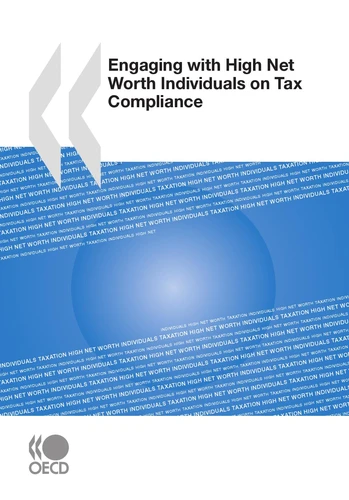Engaging with High Net Worth Individuals on Tax Compliance
Par :Formats :
Disponible dans votre compte client Decitre ou Furet du Nord dès validation de votre commande. Le format Multi-format est :
- Pour les liseuses autres que Vivlio, vous devez utiliser le logiciel Adobe Digital Edition. Non compatible avec la lecture sur les liseuses Kindle, Remarkable et Sony
 , qui est-ce ?
, qui est-ce ?Notre partenaire de plateforme de lecture numérique où vous retrouverez l'ensemble de vos ebooks gratuitement
Pour en savoir plus sur nos ebooks, consultez notre aide en ligne ici
- Nombre de pages110
- FormatMulti-format
- ISBN978-92-64-06887-2
- EAN9789264068872
- Date de parution09/09/2009
- Protection num.NC
- Infos supplémentairesMulti-format incluant PDF avec W...
- ÉditeurOECD
Résumé
High Net Worth Individuals (HNWIs) pose significant challenges to tax administrations due to the complexity of their affairs, their revenue contribution, the opportunity for aggressive tax planning, and the impact of their compliance behaviour on the integrity of the tax system. This publication examines in detail this taxpayer segment, describes their usage of aggressive tax planning schemes and proposes prevention, detection and response strategies that tax administrations can use to respond to these challenges.
It also addresses aspects of voluntary disclosure initiatives for past non-compliance that may be particularly pertinent in the current environment. The publication outlines a number of innovative approaches to enable governments to better manage the risks involved with marketed tax schemes and tailor-made arrangements. To improve compliance, tax administrations could consider changing the structure of their operations to focus resources effectively, for example, through the creation of a dedicated HNWI unit.
Other recommendations include creating the appropriate legal framework, exploring forms of co-operative compliance and engaging more in international co-operation, at both the strategic and operational level.
It also addresses aspects of voluntary disclosure initiatives for past non-compliance that may be particularly pertinent in the current environment. The publication outlines a number of innovative approaches to enable governments to better manage the risks involved with marketed tax schemes and tailor-made arrangements. To improve compliance, tax administrations could consider changing the structure of their operations to focus resources effectively, for example, through the creation of a dedicated HNWI unit.
Other recommendations include creating the appropriate legal framework, exploring forms of co-operative compliance and engaging more in international co-operation, at both the strategic and operational level.
High Net Worth Individuals (HNWIs) pose significant challenges to tax administrations due to the complexity of their affairs, their revenue contribution, the opportunity for aggressive tax planning, and the impact of their compliance behaviour on the integrity of the tax system. This publication examines in detail this taxpayer segment, describes their usage of aggressive tax planning schemes and proposes prevention, detection and response strategies that tax administrations can use to respond to these challenges.
It also addresses aspects of voluntary disclosure initiatives for past non-compliance that may be particularly pertinent in the current environment. The publication outlines a number of innovative approaches to enable governments to better manage the risks involved with marketed tax schemes and tailor-made arrangements. To improve compliance, tax administrations could consider changing the structure of their operations to focus resources effectively, for example, through the creation of a dedicated HNWI unit.
Other recommendations include creating the appropriate legal framework, exploring forms of co-operative compliance and engaging more in international co-operation, at both the strategic and operational level.
It also addresses aspects of voluntary disclosure initiatives for past non-compliance that may be particularly pertinent in the current environment. The publication outlines a number of innovative approaches to enable governments to better manage the risks involved with marketed tax schemes and tailor-made arrangements. To improve compliance, tax administrations could consider changing the structure of their operations to focus resources effectively, for example, through the creation of a dedicated HNWI unit.
Other recommendations include creating the appropriate legal framework, exploring forms of co-operative compliance and engaging more in international co-operation, at both the strategic and operational level.


















